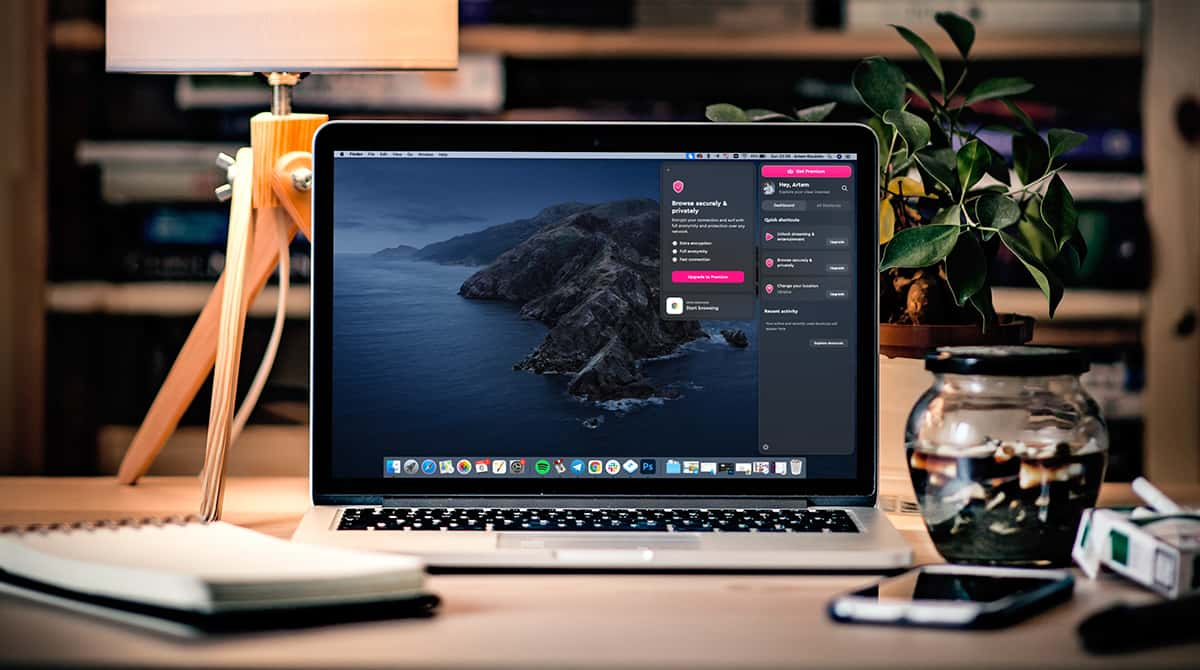VPNs or virtual private networks have become hugely popular in the last few years, thanks in part to the way that they allow you to mask your locations. This allows you to view streaming video services that are only available in your home country while you’re traveling, or watch services like Netflix that are intended for a different country — so, for example, if you live in Europe you could watch the US version of Netflix. There are a number of VPN services available, both free and paid for, but they vary in lots of ways, including price and the features they offer. So, which is the best VPN for Mac?
What is a VPN?
VPN is an abbreviation of a virtual private network. The easiest way to think of it is as a tunnel between you and whatever online service or website you’re visiting. Instead of connecting to your ISP’s servers and then from there to a website, you bypass your ISP an connect to the VPN server and from there to the online destination. Most VPN services have servers in multiple geographic locations and the one you choose to connect to will determine which country the website or service you’re visiting thinks you’re coming from. Hence, you can pretend to be in a different location — useful if you need to bypass restrictions place on internet access by your own government or by the website you’re connecting to. You connect to a VPN using a Mac VPN client, usually supplied by the company operating the service.
In addition, VPNs encrypt the data that travels on their network. That means it’s a much more secure way to use the internet, particularly if you’re connected via a public wifi network such as those in coffee shops or airports. It also means it’s much more difficult for hackers, or anyone else, to snoop on your online activity. If this is an important feature to you, make sure that the service you choose anonymizes traffic and doesn’t share details of customers with anyone, including law enforcement authorities. There have been occasions when companies have claimed their service is secure and anonymous and then have been found to have been sharing details.
The other reason for using a VPN is if you’re connecting to a local network when you’re working remotely. However, on those occasions, the company you’re working for will have set up its own VPN and configured your Mac to connect to it.
Why do I need a VPN?
As we said above, one of the main reasons for using a VPN is to be able to access services that are restricted in the country where you’re currently located, including streaming media services that are intended for customers in a different country.
The other main reason is security. The fact that VPN connections are encrypted makes them much safer when you use public wifi. For example, you shouldn’t connect to your online bank over an open public wifi connection, but with a VPN in place, it’s fine.
Tip: If you care about the security, you should think about managing Wi-Fi networks on your Mac. The point is that your computer stores a list of all networks you've earlier connected to and connects to them automatically. These include insecure open Wi-Fi hotspots. If you want to fix that quickly and easily, we recommend using CleanMyMac app. It has a special tool that allows you to see the list of all secure and open networks and remove them right away.
Finally, some people use VPNs because they have a fundamental objection to the restrictions placed on online activity by their government. These include obligations placed on websites to verify your identity before they allow you to access the content. By setting up a VPN to mask your location, you can make it appear that you’re in a different country and therefore not have to provide personal data.

Best paid VPN
Here are some of the best of the paid VPNs for Mac only cost a few dollars per month and ensure you get a secure connection and access to any content.
1. ClearVPN
ClearVPN is the first effortless VPN for a personalized and secure online experience. ClearVPN features shortcuts for quick content access and lets users browse the web safely and privately without having to pick a server location, thanks to its unique DynamicFlow Technology. ClearVPN automatically analyzes the user's current network status and connects them to the fastest idle server to enable secure, low-ping, and smooth access based on their activity or goal.
2. NordVPN
NordVPN is probably the most widely know VPN service for Mac. It has excellent security features, including a kill switch that ends your connection to the internet if the VPN drops out. On top of that, the company doesn’t keep any records of your online activity. There are 4,400 servers in 62 countries, a huge selection. And it’s Mac app is easy to set up and use. There are also mobile apps and you can connect up to six devices. NordVPN starts at a couple of dollars a month if you sign up for three years.
3. ExpressVPN
ExpressVPN has over 2,000 in 148 different locations. But it supports a maximum of three devices. However, its Mac client is excellent and easy to use and It’s lightning fast. Its privacy policy is also rated favourably.
As you can see, when it comes to choosing a VPN for your MacBook or any other VPN Mac client, there’s a great deal to consider. The good news is that when when you’re ready to set up a VPN on Mac, it’s very easy as they all come with their own setup app, and some even have a Safari VPN extension. If you’re thinking about choosing a free VPN, rather than paying for one, be aware that you’re likely to have to put up with ads on your desktop and your data may be passed to third parties. That compromises one of the key benefits of using a VPN — security. You’ll also have a cap on the data you can transfer on a free VPN.
Paying a few dollars a month, especially if you use a VPN regularly, is very worthwhile.
Best free VPN for Mac
Before deciding that you want a free VPN rather than one you have to pay a subscription for every month, you should know that there are consequences. Free VPNs often have a data cap, meaning they limit the amount of data they allow you to transfer every month. That’s fine if you only want to use it when you work from your local coffee shop, not so good if you want to connect to it permanently.
Also, free VPNs have to make money somehow and for some, that means installing toolbars that show you adverts or have links to products they want to promote. For others, it means passing your data to third parties — including information on the sites you visit. If you’re happy with those conditions, read on. If not, jump to the Best paid-for VPN for Mac.
1. TunnelBear
Of all the free VPNs for Mac, this is one of the best. It has a free tier and a paid-for tier, and the free tier limits you to 500MB per month. On the plus side, it has around 1,000 servers in more than 20 different countries and allows you to connect up to five devices at a time. So you could use it for your Mac, iPhone, and your iPad. It’s Mac client is user friendly and easy to use, though, like all free VPNs, the number of features is limited.
2. Windscribe
If TunnelBear’s 500MB restriction doesn’t appeal, Windscribe offers 10GB/month. What’s more, you can “earn” an additional 5GB by tweeting about the service and 1GB for referring a friend. You only need a user name and password to sign up, so it’s one to choose if you’re worried about giving out your email address. And for those concerned about privacy, there’s some very good news: Windscribe doesn’t store connection logs, the sites you’ve visited, or IP stamps; everything is deleted within minutes of you ending a session. And, it has a built-in ad-blocker and firewall — making it a real winner for anyone who needs privacy.
On the downside, it only has servers in eight locations, and you can only connect one device.
3. HotSpot Shield
HotSpot Shield’s data limit is 500MB/day, which is better than either TunnelBear or Windscribe. It also allows you to connect from up to five devices. And it has servers in 25 locations. However, you can’t choose which location you connect to; it’s chosen for you. HotSpot Shield is funded by adverts, which means it places adverts on your Desktop when you’re connected to it. It’s probably not the one to choose if privacy is your main concern.






